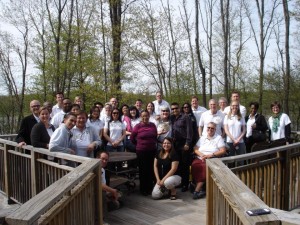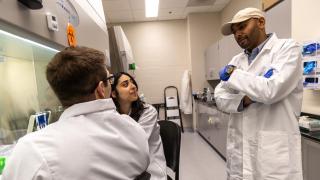
 Michigan Road Scholars meet with tribal leaders from the Gun Lake Tribe.
Michigan Road Scholars meet with tribal leaders from the Gun Lake Tribe.
The five-day road trip took the group on a journey throughout the state—stops included Lansing, Grand Rapids, Traverse City, Petoskey, Sault Ste. Marie, Bay City and Detroit.
The mission? Expose participants to the state’s varying economies and cultures and increase mutual understanding between the university and local communities.
“As a state university, it’s important for us to connect with the various parts of Michigan and for the people around the state to be connected to UM-Dearborn” said John Cristiano, co-director of the Institute for Advanced Vehicle Systems and director of the Center for Engineering Education and Practice. “We are a diverse state and the Road Scholars tour provided the opportunity for us to learn from each other.”
Stops offered insight into the workings of Michigan’s economy. At Emergent BioSolutions in Lansing, participants learned of the world’s first anthrax vaccine; while a visit with Goodwill Industries of Greater Grand Rapids showed how the non-profit curbs waste while maximizing profits. These profits are in turn used to eliminate barriers to opportunity and help people in need reach their full potential through learning and the power of work.
Family-owned businesses like Bay Carbon and community organizations like Detroit Hispanic Development Corporation exhibited how a handful of people can positively impact the region.
Cristiano was joined on the trip by Jorge Gonzalez del Pozo, associate professor of Spanish, Brooks Hull, professor of economics, Trista Wdziekonski, director of graduate studies, and Jennifer Zhao, professor of mathematics.
For Zhao, Michigan Road Scholars was an opportunity to connect with communities and industries as a representative of the university.
“It’s important to send a message that we’re here,” Zhao said. “And now, especially with housing available, it’s important to reach out and be visible; I want to promote UM-Dearborn throughout the state.”
While the structure of the trip didn’t focus on formal promotion, networking opportunities on the bus led to increased understanding of the work of UM-Dearborn faculty and staff among their Ann Arbor and Flint counterparts.
“The trip was a reminder that we are a part of the U-M tradition,” Wdziekonski said. There’s potential to collaborate across campuses and across fields in ways that will benefit the university as well as the state.”
Michigan Road Scholars was established by the Offices of the Provost and the Vice President for Government Relations at U-M Ann Arbor. The application form for the next tour will be available for 30 days, usually beginning in November.




